The best in poetry, (and poetic things), this week with Matthew Kreider.
1 Art
Years ago, Bono scared me with five gravely, hard-to-swallow words: “Every poet is a thief.” I struggled to understand how my rock-and-roll savior could suddenly condone a lifestyle of black leather and thievery. But over the years I’ve discovered the thrilling necessity of poetic larceny. With or without the leather. This example steals paintings to construct personal memory. What about you? What poems would you choose?
At age 12, I learned a hard lesson while writing my first book of poems for a local young authors’ conference: even small writers experience profound alienation and pain. Grownup Allain de Botton is an atheist who is full of sympathy. His book, Religion for Atheists: A Non-believer’s Guide to the Uses of Religion, discusses mankind’s general need for salvation and how artists suffer when they “overlook how many aspects of the faiths remain relevant even after their central tenets have been dismissed.”
2 News
The haiku purist keeps to puddles and lakes. But if we expand the definition of nature to include human nature, then any section of the newspaper is fair game. Visit Inadvertent Haiku to see what happens when writers jettison journalism’s inverted pyramid in favor of the balance of a 5-7-5. The poems are then linked to original graphic art. Brad Woodward says,
“Neither the image or the haiku tell you the full story, which is why there is always a link to the full article. Leaving it to you to discover the wit and humor hidden within the remarkably clever haikus and illustrations.”
Isn’t this how you always dreamed of reading a newspaper?
Somehow, your favorite Swede, Tomas Transtromer, has managed to publish three books of poetry since winning his Nobel prize less than six months ago. Go figure. From what I hear, his style and syntax lend themselves particularly well to translation. Explore the art of translation.
3 Publishing
A friend of mine recently pinned a photo of Ticonderoga pencils on Pinterest. You bet I took note. But do these media castles of eye candy, such as Pinterest, actually catch the eye of the publishing industry? And should writers be lounging around in these digital country clubs, just to be seen? Check out these observations from a recent Book^2 Camp underground (un)conference in NYC.
Publishers are dreamers, too. Writers often forget that. Here’s an interview with William Waltz, founder and editor of Conduit. Find yourself a large chair, sit back and enjoy the dream.
4 Business
Playfulness is central to creativity. In fact, one of Tweetspeak Poetry’s most endearing qualities is its open invitation to play with words. Well, here’s an example of the business world catching on to the importance of play in the workplace. Stewart Brown, founder of the National Institute for Play, says, “Most people think that the opposite of play is work (especially in the corporate world) but the opposite is boredom or even depression.” Enjoy this conversation with two playful souls at IDEO’s toy lab.
5 Creativity
Okay, remember my Ticonderoga pencil? Every morning at work, after taking my first sip of coffee, I sharpen a pencil. The smell and weight of the shaved wood rouse up a deep craving within me to create. According to Martin Lindstrom, a 2009 recipient of TIME Magazine’s “World’s 100 Most Influential People”, these cravings which direct our behavior are often prompted by sensory-based signposts. After reading Lindstrom’s article on branding and cravings, you might be inspired to sharpen your own environment, making it more conducive to creativity.
To get yourself started, make some notes on a handy-dandy Action Pad Mini. Behance knows the practical needs of creatives. (Yes, I said practical.) Drawing on research, they’ve developed a line of products to suit your temperament. They designed the Action Pad for themselves. And now they’re ready to share.
6 Write-It
Are you holding your favorite coffee mug? Well, put it down. The creative team at T.S. Poetry invites you to wrap your hands around a one-of-a-kind piece of art. Submit your mug shot by March 31 and, if yours is selected, you can choose: (1) a poem written just for you by a published poet placed on the mug with a breathtaking image from Kelly Sauer Photography, or (2) a poem you wrote will be placed alongside an image of your choice from Kelly Sauer Photography. It doesn’t get more personal than this.
Right now, Washington D.C. is ripe for your poetry. The annual cherry blossom festival is just around the corner. Check out this haiku contest.
7 Poems
L.L. Barkat is known just as much for sitting still as she is for blazing a thousand trails. Here’s a poem that studies the movement of a slow and unbuttoned rest. Read Ontology.
Like any writer, Ms. Barkat needs to let go of words sometimes. Just let them spill all over the table. Here’s The Undoing, her freshly-arranged response to a recent poetry prompt.
8 People
“We tend to think of philosophers, artists or poets as the polar opposite of chief executive officers, bankers or businesspeople, ” says Robert Shiller. But if you’re still a curmudgeon, then you’ll have to take it up with Walt Whitman. Shout it from the rooftops: “Whitman was a business man.”
Joel Daily is a poet with ex-girlfriends. One got in touch with him recently. “Actually, she was cleaning out her attic and stumbled upon a box of my letters, poems I’d written, etc. She was going to throw it all away but then thought better, found and emailed me, and sent this box, a literal and figurative blast from the past, ” he says. “In exchange I sent her some recent books.” Oh, poetic justice.
9 Education
A poet laureate walks into a bar. And sends a text message. Seriously. Britain’s Carol Ann Duffy believes our mobile generation is fertile ground for poetry. “The poem is a form of texting … it’s the original text. It’s a perfecting of a feeling in language – it’s a way of saying more with less, just as texting is. We’ve got to realise that the Facebook generation is the future – and, oddly enough, poetry is the perfect form for them.” For young people. Do you believe that? Do you know teenagers who love Tweetspeak? Let’s engage the radical youth. Ideas?
High school is messed up. How do I know? Because I teach in one. Thank goodness we have people searching for new models of education. Meet Scott H. Young. He’s in the middle of a year-long experiment to learn the computer science curriculum at MIT, without going to class. Back in the 19th century, industrialization rhymed with education. Not anymore.
10 Sound n Motion
It’s time to celebrate the 25th birthday of those cute little GIF files. Sure, they’ve been around the block, but just look at them now. Watch a fun PBS video: Animated GIFs – The Birth of a Medium.
Finally, watch this video and be inspired to fail, even on purpose.
Photos by Claire Burge. Used with permission. Post by Matthew Kreider.
___________
Buy a year of Every Day Poems, just $5.99— Read a poem a day, become a better poet. In March we’re exploring the theme Angels.
- Casting a Line for Surrealist Poetry - November 12, 2012
- The History of the World in Beer - October 22, 2012
- Journey into Poetry: Matthew Kreider - July 23, 2012

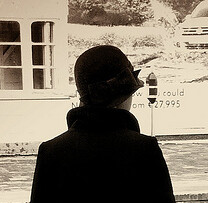
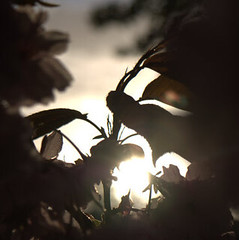
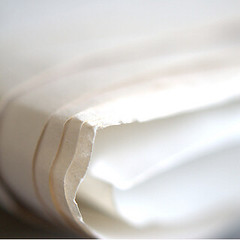
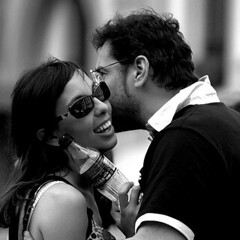
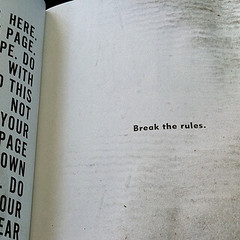
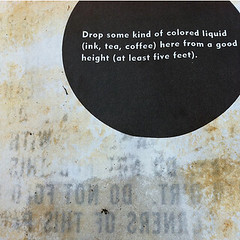

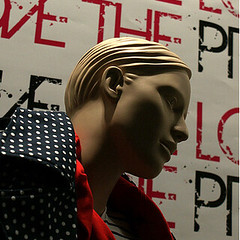


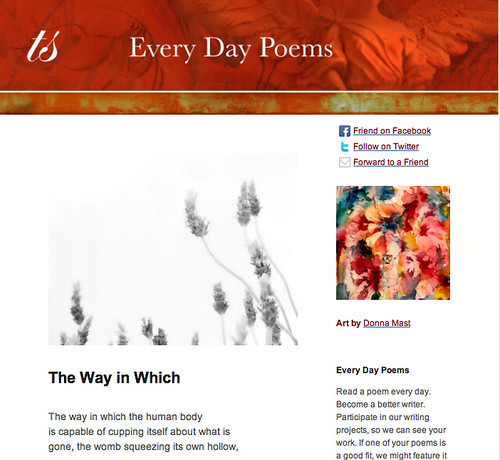
L. L. Barkat says
I had my girls try the construct-a-personal-memory thing; I’ll have to find a way to share the loveliness.
Love the idea of news in Haiku! Like taking life and trying to explain it by handing it over through a funnel, small side up. 🙂
Megan Willome says
Your haiku link reminds me of one of my favorite things on the web–Haiku Friday every Friday at Mark Osler’s blog: http://www.oslersrazor.blogspot.com. Fun, fun, fun and most of the participants are not poets. The joy of my life was co-winning Haiku Friday and getting a fake bio the following Monday (which is where my “failed liturgical dancer” comes from).
L. L. Barkat says
Megan, that sounds so amusing. What was your fake bio? 🙂
Maureen Doallas says
Like the Inadvertent Haiku!
Will Willingham says
I tried to pour
through the funnel
upside down
but the letters ran
down the side
leaving serif streaks
Glynn says
Alain de Botton’s book sounds like a great read. I’ve been spending time lately looking at the creative process – in conjunction with a project I’m working on. My question is – since we’re made in God’s image, can we create art, writing, anything creative at all that doesn’t reflect the Creator – even if we’re atheists?
L. L. Barkat says
Glynn, have you read anything else by Botton? Lyrical, deep. Really good stuff 🙂 Need quiet to concentrate though.
Matthew Kreider says
Glynn, interesting question. The creative act does reflect something of God. But maybe our vision is such that, unless God is in it, we cannot fully understand how it refracts and bends His light..
Matthew Kreider says
L.L., Maureen and Megan — And what is it about the haiku? People love it. Is it because the form gives us an opportunity to distill the omnipresent dumping of information in our culture? That constraint of seventeen syllables forces our messy experiences into a manageable size.
Still, the gift of poetry is that, though it presses our experiences into a tiny colored capsule, it rises like a spongy lion, when dropped into water.
Matthew Kreider says
Goodness. You need some Helvetica. 🙂
Kimberlee Conway Ireton says
Matthew, your blurbs here are so tempting! Especially the news haiku: how cool is that? But how am I ever going to read all these posts you’ve linked to?
Matthew Kreider says
I know, Kimberlee. I know. Time is hard to find. But we learn to sit still, don’t we? On the floor, with our head on our knees, and just work on our breathing.
I seem to remember those words from a wise woman recently. 😉
Cassie says
I really enjoyed reading this and your links. I learned so much. I esp. liked the failure video with the quotes!
Matthew Kreider says
Cassie – I loved the quotes, too. Many of the messages took me by surprise. Thanks for stopping by and leaving a comment. Did any of these links inspire you to make poem?